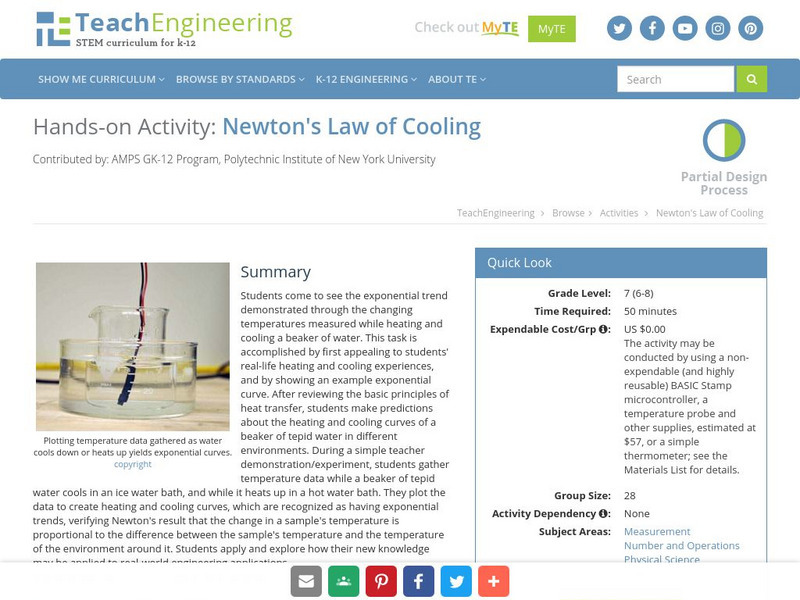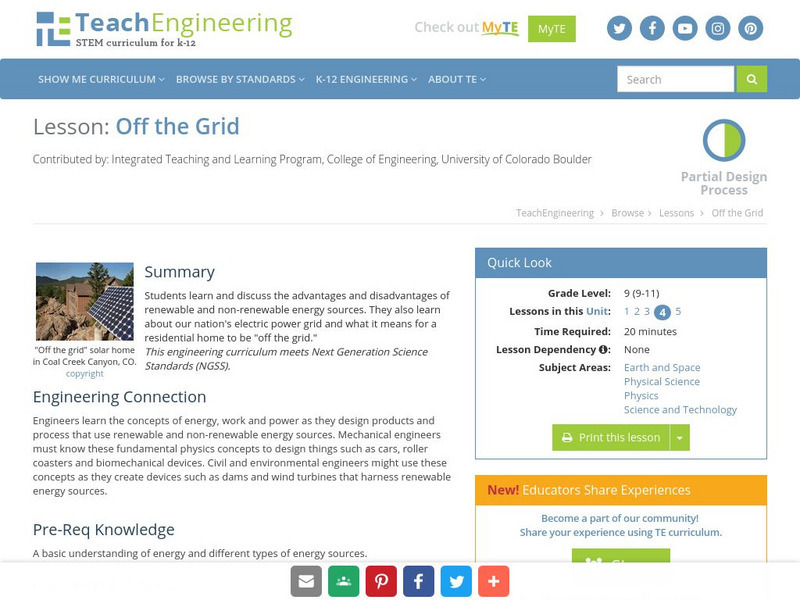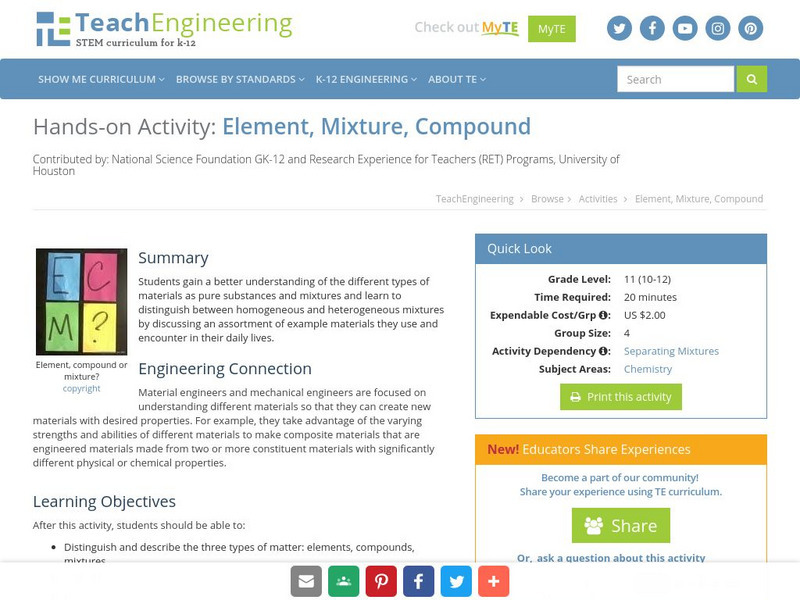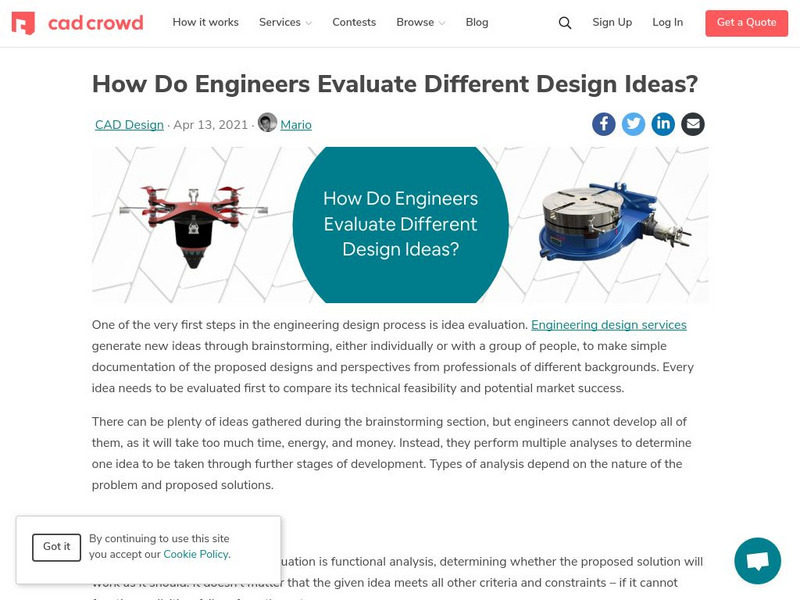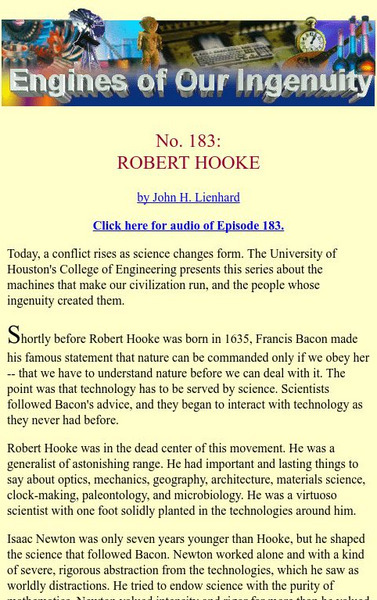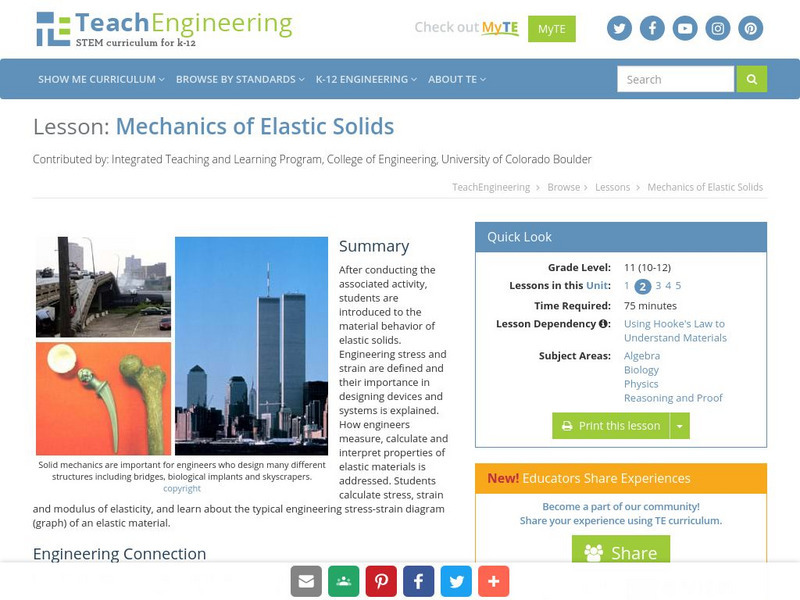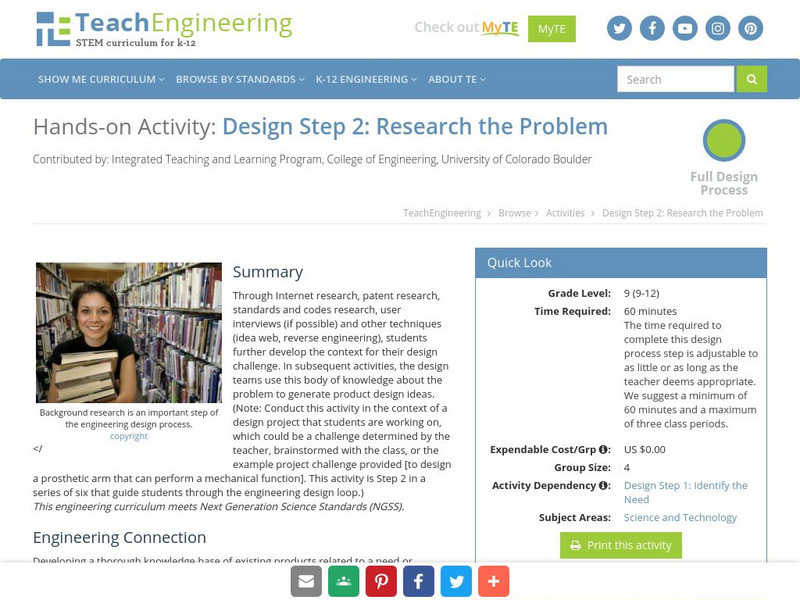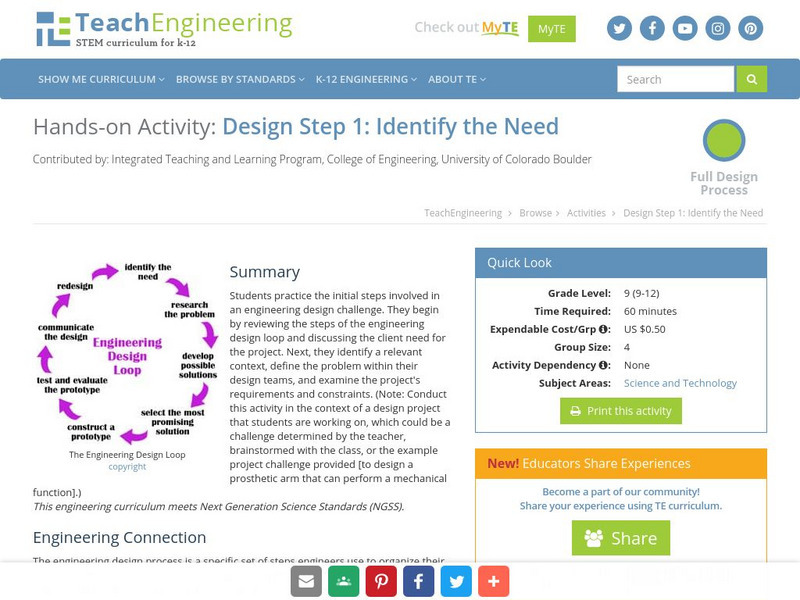TeachEngineering
Teach Engineering: Newton's Law of Cooling
Middle schoolers come to see the exponential trend demonstrated through the changing temperatures measured while heating and cooling a beaker of water. This task is accomplished by first appealing to students' real-life heating and...
TeachEngineering
Teach Engineering: Off the Grid
Students learn and discuss the advantages and disadvantages of renewable and non-renewable energy sources. They also learn about our nation's electric power grid and what it means for a residential home to be "off the grid."
TeachEngineering
Teach Engineering: Element, Mixture, Compound
This hands-on activity will help the students have a better understanding of different types of materials as pure substances and mixtures and distinguishes the homogeneous and heterogeneous mixtures by discussing some material they use...
Learn Engineering
Learn Engineering: Velocity Analysis: Mechanics
Learn how a velocity analysis is necessary to make sure a mechanism is properly designed. This video will discuss how a velocity analysis is completed. Site also includes an article which discusses concepts found in video. [5:07]
Colorado State University
Csu Internal Combustion Engines
Dr. Allan T. Kirkpatrick of Colorado State University presents extensive detailed information on thermodynamics, heat transfer in engines, and fluid mechanics.
Other
Cad Crowd: How Do Engineers Evaluate Different Design Ideas?
Explains all the things that must be taken into consideration when engineers evaluate the soundness and viability of a particular design.
Learn Engineering
Learn Engineering: Theory of Vibration
Did you know that some bridges have failed due to the effect of vibration? This article and video explore vibration and its importance in the design of civil structures and mechanical equipment. The article discusses all concepts covered...
Science Buddies
Science Buddies: Knock Your Blocks Off: The Mechanics of Carnival Games
Why are those "simple" games at the fairs, carnivals, and boardwalks so hard? Is it really lack of skill or coordination or do those concessionaires use some basic laws of science to help them set up the games in their favor? This...
University of Houston
University of Houston: Engines of Our Ingenuity: Robert Hooke
The transcript of a talk given on the syndicated radio broadcast titled "The Engines of Our Ingenuity." Interesting account of Robert Hooke. Using a captivating and engaging story line, the article tells of Hooke's many interests in...
TeachEngineering
Teach Engineering: Powerful Pulleys
Learners continue to explore the story of building a pyramid, learning about the simple machine called a pulley. They learn how a pulley can be used to change the direction of applied forces and move/lift extremely heavy objects, and the...
TeachEngineering
Teach Engineering: Let's Move It!
Students explore methods employing simple machines likely used in ancient pyramid building, as well as common modern-day material transportation. They learn about the wheel and axle as a means to transport materials from rock quarry to...
TeachEngineering
Teach Engineering: Simple Machines and Modern Day Engineering Analogies
Students apply the mechanical advantages and problem-solving capabilities of six types of simple machines (wedge, wheel and axle, lever, inclined plane, screw, pulley) as they discuss modern structures in the spirit of the engineers and...
TeachEngineering
Teach Engineering: Energetic Musical Instruments
Students will learn to apply the principles and concepts associated with energy and the transfer of energy in an engineering context through the designing and making of a musical instrument. The students must choose from a variety of...
TryEngineering
Try Engineering: Tinkering With Tops
Learners learn about the engineering design process as they design, build, and test spinning tops using everyday materials. The objective of the design is to have the top spin at least 10 seconds within a thirty centimeter diameter.
TeachEngineering
Teach Engineering: Engineering in Reverse!
Students learn about the process of reverse engineering and how this technique is used to improve upon technology. Students analyze push-toys and draw diagrams of the predicted mechanisms inside the toys. Then, they disassemble the toys...
TeachEngineering
Teach Engineering: Next Generation Surgical Tools in the Body
Through this unit, students act as engineers who are given the challenge to design laparoscopic surgical tools. After learning about human anatomy and physiology of the abdominopelvic cavity, especially as it applies to laparoscopic...
TeachEngineering
Teach Engineering: The Physics of Fluid Mechanics
Five lessons about the study of fluid mechanics. The unit concludes with students applying what they have learned to determine the stability of individual above-ground storage tanks given specific storm conditions so they can analyze...
NC State University
North Carolina State Dept. Of Aerospace Engineering
This site describes the programs offered in mechanical and aerospace engineering at North Carolina State. The site includes links to programs, faculty and staff, etc.
TeachEngineering
Teach Engineering: Creative Engineering Design
Students are introduced to the world of creative engineering product design. Through six activities, teams work through the steps of the engineering design process (or loop) by completing an actual design challenge presented in six...
TeachEngineering
Teach Engineering: Mechanics of Elastic Solids
After conducting the associated activity, young scholars are introduced to the material behavior of elastic solids. Engineering stress and strain are defined and their importance in designing devices and systems is explained. How...
TeachEngineering
Teach Engineering: Design Step 2: Research the Problem
Through Internet research, patent research, standards and codes research, user interviews (if possible) and other techniques (idea web, reverse engineering), students further develop the context for their design challenge. In subsequent...
TeachEngineering
Teach Engineering: Artificial Heart Design Challenge
Students are presented with a hypothetical scenario in which they are biomedical engineers asked to design artificial hearts. Using the engineering design process as a guide, the challenge is established and students brainstorm to list...
TeachEngineering
Teach Engineering: Design Step 1: Identify the Need
Students practice the initial steps involved in an engineering design challenge. They begin by reviewing the steps of the engineering design loop and discussing the client need for the project. Next, they identify a relevant context,...
TeachEngineering
Teach Engineering: The Car With a Lot of Potential
Working in teams, students perform quantitative observational experiments on the motion of LEGO MINDSTORMS NXT robotic vehicles powered by the stored potential energy of rubber bands. Students understand that through the manipulation of...


